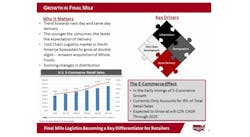Following up on the announcement late Tuesday that Wabash National will purchase Supreme Industries for about $364 million, CEO Dick Giromini on Wednesday characterized the deal as “a perfect marriage” and “a game changer.” While the company emphasized the importance of responding to the supply chain demands of e-commerce, investment analysts suggest the real benefit to the purchase will be in greatly reducing Wabash’s dependence on the cyclical highway van trailer market.
During a conference call with investment analysts and business media, Giromini checked off the ways in which the acquisition met all of the company’s “key criteria for a successful acquisition” by advancing Wabash National’s final mile strategy, accelerating growth and diversification, and providing attractive financial synergies.
In detailing these criteria, he explained that Wabash entered the final mile segment in 2015 with its truck body initiative and has been on track to meet its revenue goals—but Supreme will greatly accelerate the final mile push with additional distribution opportunities and “greater customer reach.” Giromini characterized the growing consumer preference for home delivery as “the Amazon effect.”
“This is only the beginning of the transformation we will see in the logistics and distribution model,” he said. “Wabash intends to be at the forefront of that evolution in the transportation market. The addition of Supreme will help ensure that.”
As for diversification, Supreme’s strength in the light- and medium-duty truck body segments and national manufacturing footprint, along with a “blue-chip customer base,” will reduce the Wabash dependence on the cyclical Class 8 dry van market. He specifically cited the projected growth of the truck body market, given the boom in e-commerce.
Wabash National projects that with the Supreme acquisition the company will reduce its reliance on dry vans to 50% of revenue in the first year, down from 77% in 2005. The longer-term goal is to reduce the dry van revenue to 33%.
“I would call that a perfect marriage,” Giromini said. “A marriage that creates a highly diversified player in the final mile arena, fully equipped to meet the needs of customers currently participating in the space, along with those who may enter in the future.”
In terms of business synergies, Giromini pointed to the “complementary product portfolio” and the immediate upside to economies of scale, as well as longer-term benefits through cross-selling and R&D integration. The “highly attractive margin profile” will generate earnings accretion in the first full year, he added.
Initial reaction from industry analysts was positive.
Stifel’s Michael Baudendistel characterized the deal as “an acquisition that falls firmly into the category of ‘they did what they said they would do’ and ‘we figured that would happen some day, but didn’t know it would be today.’”
“From our perspective, the deal makes a great deal of sense as it leverages the company’s capabilities, without creating additional exposure to its most cyclical segments, which we believe could ultimately help Wabash’s trading multiples,” Baudendistel said in an investor note. “Wabash focused on the increased exposure to the final mile area on the analyst call, but we believe that diversification away from dry van may be the bigger benefit to the shares over time.”
Stephens Inc. analyst Brad Delco said he was “mildly positive” for similar reasons, and also noted that Wall Street will likely be more comfortable with the Supreme acquisition than it was with the 2012 purchase of the Walker Group. He pointed to Wabash National’s better financial position over the last 12 months as well as the much improved leverage position for the Supreme deal.
About the Author
Kevin Jones
Editor
Kevin has served as editor-in-chief of Trailer/Body Builders magazine since 2017—just the third editor in the magazine’s 60 years. He is also editorial director for Endeavor Business Media’s Commercial Vehicle group, which includes FleetOwner, Bulk Transporter, Refrigerated Transporter, American Trucker, and Fleet Maintenance magazines and websites.
Working from Beaufort, S.C., Kevin has covered trucking and manufacturing for nearly 20 years. His writing and commentary about the trucking industry and, previously, business and government, has been recognized with numerous state, regional, and national journalism awards.


